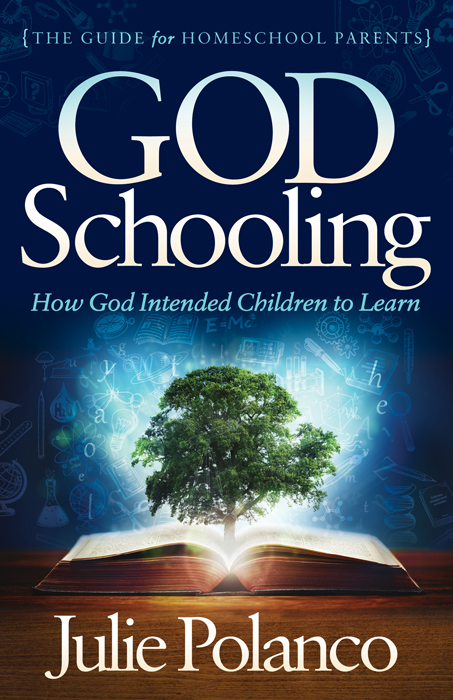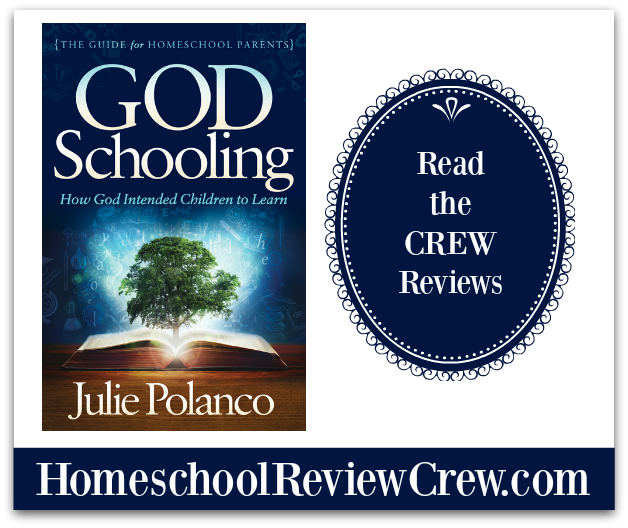Each summer I have my own list of summer reading. The list
includes some fun books but there are always several books that I include on my
reading list to remind me of why we homeschool and to inspire me for the next
step. These books are my way to recharge and renew for the next school
year. This summer I added God Schooling: How God Intended Children to Learn
by Julie Polanco to my summer reading list and I have written a brief overview
and review of it below.

The book begins with Dispelling Myths in which Ms. Polanco
discusses how the Bible supports natural learning, sometimes referred to as
"unschooling". Natural learning is guided and self-directed by
the child based on his or her interests. We as parents should lay out a
feast before them and expose them to the wonders of the world then let them
have input and choice in what they want to learn more about as well as how and
when they learn it. While I can't quite fully grasp letting my children
have so much control over their education, I do love the idea of letting them
have more freedom to take the rabbit trails to explore more about areas that
they are particularly interested in. We will still cover the boring
necessities, whether they want to or not. However, I want my children to
have a passion for learning so I believe in giving them a lot of freedom to pursue
those areas that excite them.
The author states that homeschool parents don't need to spend tons
of money on fancy curriculum and plan out every moment of their child's
education in an attempt to just imitate traditional school at home.
Although I understand the value in experiential learning through field trips,
plays, and every day activities, I personally need the structure and ideas in
our curriculums to help me stay accountable. But I do not believe in
being a slave to curriculum. We choose curriculum with each child's
particular learning styles in mind. I won't expect my children to fit into some
cookie cutter curriculum because one size does not fit all. Homeschooling
offers so many more options than a traditional school and that allows it to be
so much richer than traditional schools. The freedom of homeschooling
also allows time for parents to have more influence on their children's
character development which I feel is just as important as academic
development.
The author states that we need to pray about our children's
education and seek God to lay the path for them. She says that
unschooling "casts off grade levels, grades, tests, scope and sequence,
records, scores, and all the other trappings of school that we have been
brainwashed into believing are necessary. God did not create
schools. He created families. Jesus Christ did not teach His
disciples by doing what the Romans did. He taught them through His
relationship with them and using stories and experiences that would capture
their hearts." (p. 20) I love this quote because it is such an
important reason to homeschool. As homeschool parents, we get to spend
all day with our children, not only helping them learn but also influencing
their growth into the amazing man or woman God has created each of them to be.
If they were in a traditional school all day for 5 days a week, we
would not have that important influence in their lives. They would be
guided more by worldly-focus rather than Jesus-focus.
Next the book covers Motivation and Excellence. Ms. Polanco
states that giving children rewards for doing good work is a hinderance for
them because it encourages a external motivation for their behavior. We
want to instill intrinsic, internal motivation for children to want to learn and
do well. Children look up to their parents and want to be like them so as
parents, we can inspire our children to excellence as well as how to persevere
through difficulties through leading by example.
The remainder of the book is mostly about how to implement these
concepts into your homeschool by age group which includes children under age
eight, children age eight to twelve, and teens. For children under age
eight, I completely agree with Ms. Polanco when she states that children should
be allowed a lot of time for active play. She cites research that shows that
nerve growth in the brain which helps with executive decisions and emotions is
enhanced through play. But play does not mean playing video games.
I love this quote - "If the child has to physically build it, mold it,
move it, provide the sounds, imagine it, create it, etc. then it is true play.
Pressing buttons is not playing." (p. 56) Too many people think that
video games are an acceptable way for children to spend all of their free time.
I disagree. Young children need to learn through exploring their world and
using their creativity and imagination. I would add that playing outdoors
and exploring nature is really the best form of play there is. At this
age, free time to play and explore is more important than desk work and
learning math facts.
For children
age eight to twelve, Ms. Polanco states that play and movement are still an
important mode of learning but she also discusses the importance of serving
others. "Service builds character, selflessness, and better
relationships between themselves and all whom they come in contact with.
They learn how to see needs in their community and strive to fill those needs.
They feel needed, useful, and gain empathy. It helps them connect with
others and learn more about themselves in the process." (p. 72) In
addition to service, children this age are able to do meaningful work and might
be interested in pursuing entrepreneurship. I wholly support this
idea. Many parents would say this age is too young to really do or make
anything of any consequence. However, I think children will rise to the
level of expectation we set for them and many amazing things have been done and
invented by children age twelve and under. The author also goes into more
detail about how her children naturally learned math, reading, and writing at
this age.
The section on teens was very helpful as Nicholas is about to enter high school. It talks about the stereotype of teens as being lazy and irresponsible. Why does society still look at them as children? "A teenager should be doing everything you do, including cooking, mowing the lawn, fixing things, and going on errands alone. If you expect responsible behavior and set teens up for success, they are more likely to meet your expectations." (p. 101) Ms. Polanco also points out that other countries around the world give teens the same responsibilities as adults but in America we seem to allow them to slip into a stage of idleness where they don't strive for much and therefore don't accomplish much. It doesn't have to be this way. Teens can spend their time in productive ways that contribute to their community and help their family while building their skills and self-confidence.
The author talks about the importance of teens finding their identity so that they better understand what their true passion are. "Time to think and explore is still vital. How else will they find their passion? A life stuffed full of classes and extracurricular leaves little room for inner discovery. Pressuring teens to decide on a career when they may not even have a grip on who they really are often leads to false starts and wasted money later." (p.109) Many teens feel anxiety and depression because they don't feel they have much direction or control in their own future.
The book then goes on to discuss some creative ideas for paying for college, college alternatives, as well as how to prepare transcripts and record-keeping.
While I might not agree with the concept of 100% natural learning and bypassing those enticing curricula that look so promising, I did find this book to be a refreshing reminder of several of the reasons why we chose to homeschool our children. It ultimately comes down to the freedom for our children to have the time to pursue their God-given interests, to develop a passion for learning, and to grow in their relationship with us and with Jesus.
For more information about the author, Julie Polanco, check out her website: http://www.juliepolancobooks.com/. If you would like to read more reviews about God Schooling: How God Intended Children to Learn from other members of the Homeschool Review Crew, please click on the link below:














